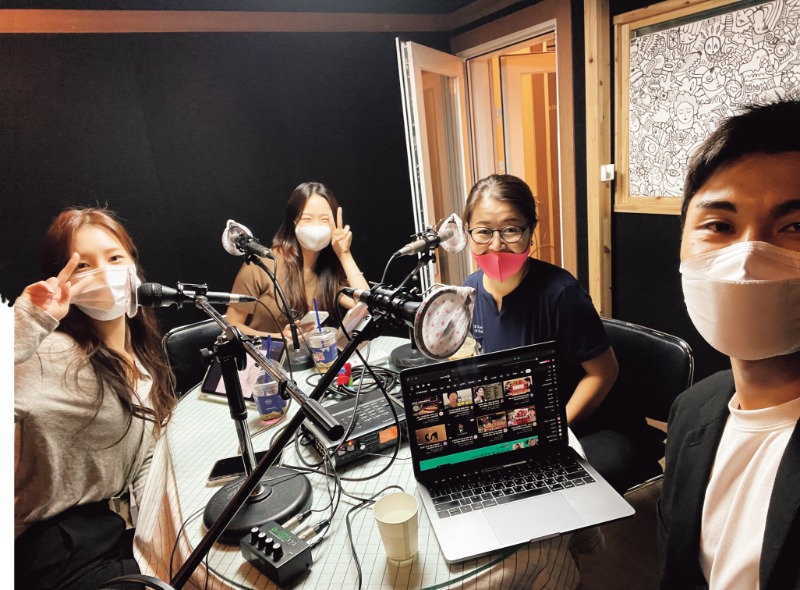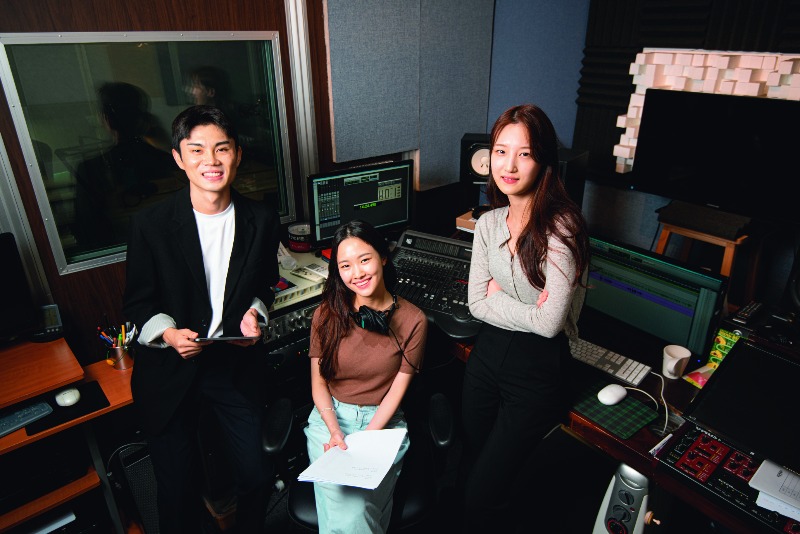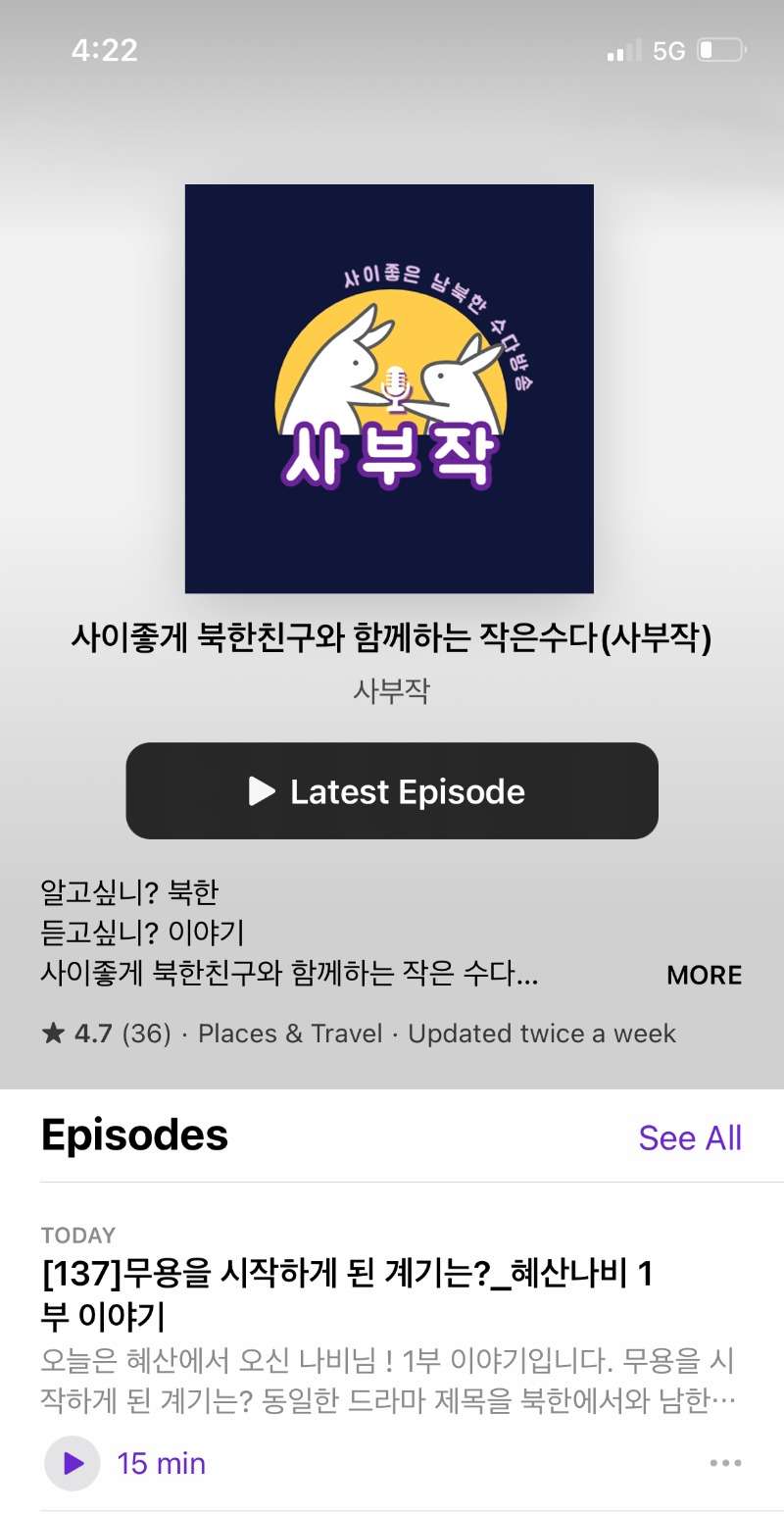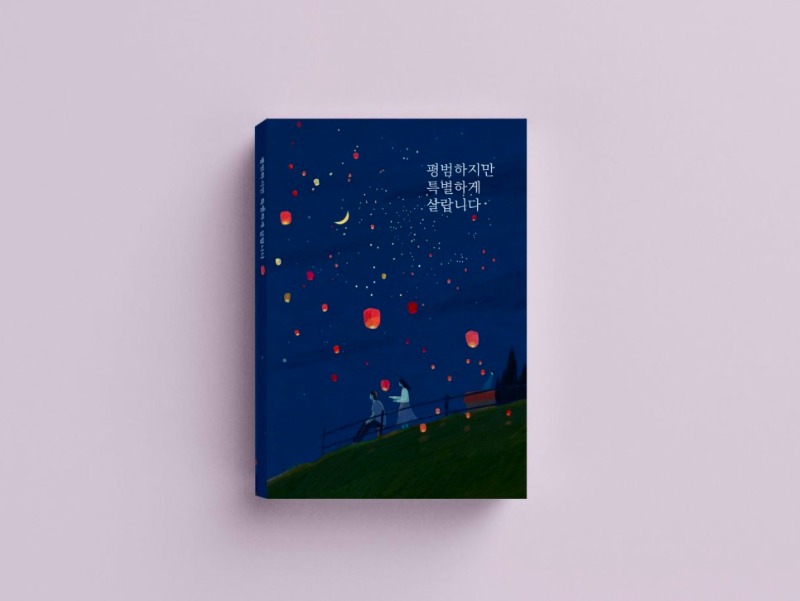“Sabujak,” a podcast produced by university students, hands a microphone to North Korean refugees in hopes of increasing acceptance of the group in South Korean society. The radio broadcast helps them let down their guard through candid conversations under assumed names.
“To tell the truth, I’m from North Korea.”
Any North Korean refugee living in South Korea needs considerable courage to utter this simple statement because it typically invites suspicion, derision and discrimination.
“Sabujak” (podcast_sabujak) attempts to soften these hardened attitudes through candid conversations with North Korean refugees. The radio podcast, run by university students in Seoul, thereby aims to remove prejudice toward resettlers from the North and break through the emotional wall that segregates them.
In the student operators’ ideal world, “I’m from North Korea” should elicit a response as nonchalant as, “Oh, yeah? I’m from Daegu,” rather than condescension. Hence the name of their podcast: a crafted mashup of Korean words that mean “a small, amicable chat with friends from North Korea.”
Most of the guests are reluctant to be identified for fear that their families in the North may face abuse. They prefer using nicknames, which have included “Kyongsong Pine Mushroom” and “Hyesan Potato Rice,” suggesting links to Kyongsong County in North Hamgyong Province and the city of Hyesan in Ryanggang Province, with their signature foods.

Most guests on Sabujak, a podcast produced by university students, want anonymity. But some guests allow their real name or face to be revealed. Park Ye-young, head of the Unified Korea Cooperative, appeared in a three-part program from October 11 to 13 this year, under the nickname “Kim Chaek Hairy Crab.” From left: Sabujak staff members Park Se-ah and Ahn Hye-soo, and Park Ye-young.
© Sabujak
GUESTS
The promise of anonymity helps persuade North Koreans to accept an invitation to the talk show. At the beginning of the podcast, most guests waver. But soon, nostalgic thoughts seemingly melt away the hesitation to speak candidly about their life and birthplace. After leaving the recording studio, many say they feel more confident about coping with their life in the South and being more forthcoming.
“After each program recording, guests say, ‘I’ve tried so far to forget bad memories about North Korea. But speaking about my experiences today, I’ve come to accept my past somewhat more.’ I feel happy then, because of whatever small, positive effects our podcast can have on them,” said Park Se-ah, a Yonsei University student and a producer of the program. She joined the podcast as a volunteer, a follow-up after tutoring children from North Korea and a budding interest in North Korean refugees.
The podcast began in 2018. It was the brainchild of Park Byung-sun, then a business administration student at Yonsei University. Now he works at a consulting company.
“I launched it in the hope that South Koreans would feel no distance from, and become more friendly with, North Korean refugees if they heard about refugees’ experiences on a podcast,” said Park. “I thought I shouldn’t turn away from the prejudice and discrimination that refugees experience in our society. I therefore concluded that I should launch a podcast that would broadcast their unedited stories as they are.”
THE BEGINNING
The first broadcast aired in August 2018 through Project Jieum, a social startup club at Yonsei affiliated with Enactus. An international non-profit organization, Enactus was founded by the U.S. National Leadership Institute in 1975. Jieum, whose metaphorical meaning is “intimate friends,” has expanded its membership base beyond Yonsei to include students from Catholic University of Korea, Sogang University, Seoul National University, Sungshin Women’s University, Ewha Womans University and Chung-Ang University.
Three teams of three student staffers operate the podcast. Everyone has to be a multitasker, extending invitations and serving as a host, editor or director from one broadcast to the next. The podcasts are recorded at Studio Bombyeot (Spring Sunray) near Hongik University nearly every week of the fall and spring semesters, with each term considered a “season.” A show usually consists of three parts, each lasting 12-15 minutes; the first segment is about life in North Korea and foods from the guest’s hometown, the second about escaping the North, and the third about settling down and living in the South.
Before recording, producers have an online chat with the guests to create a natural rapport and outline the program, but no defined is drafted. The format is a free-flowing conversation. Political or religious topics are off limits in principle, but are sometimes lightly touched upon at a guest’s behest. During the initial seasons, most guests were college students; it was easier to invite them as they were the same age as the producers. Of late, guests from various age groups are appearing as the program becomes better known and previous guests introduce it to their relatives and acquaintances.
So far, the show has hosted about 130 guests. Most can be described as ordinary people; this is by design. In addition to addressing the emotional distress and barriers refugees endure in South Korea, the producers aim to chronicle the stories of North Korean individuals who have never been in the spotlight and to convince South Koreans that refugees have more in common with them than they realize.
One of the most memorable guests was a businessman who was wanted by the North Korean State Security Department for his activities as a broker for defectors from the age of 15. Another impressive guest was a high school student nicknamed “Kilju Meatball.” He was born and grew up in Kilju County in North Hamgyong Province, home of the Punggye-ri nuclear test site.
A few guests have revealed their real names. One was Na Min-hee. With a solid family background, she enjoyed a comfortable life in Pyongyang and secured work in Europe to earn hard currency for the North Korean regime. Another identified guest was Joo Seong-ha, who now works as an international affairs reporter for the Dong-A Ilbo, a prestigious Seoul daily. Park Ye-young, head of the Unified Korea Cooperative, wanted to reveal her real name, though the producers had given her the nickname “Kim Chaek Hairy Crab.”
“We were cheered up when Park thanked us South Korean university students for running a podcast with a deep interest in issues of the divided Korean nation and unification,” said Ahn Hye-soo. Ahn, a senior law student at Sungshin Women’s University whose grandfather hailed from Hwanghae Province, North Korea, joined the podcast after hearing about it by word of mouth.

Sabujak tries to present the details of each North Korean refugee guest as candidly as possible without exaggeration or generalization. The podcasts are recorded at Studio Bombyeot (Spring Sunray) near Hongik University. The photo shows Sabujak staff at the studio. They are, from left, Ahn Seong-hyeok, Ahn Hye-soo and Park Se-ah.
OPERATIONS
Students from North Korea have also participated in the podcast’s production since Season 3, which began in September 2019. They include Ahn Seong-hyeok, a senior political science student at Yonsei, and Park Beom-hwal, a sophomore physical education student at Seoul National University. Ahn fled from Chongjin, North Hamgyong Province with his parents and arrived in the South in December 2011. He is the current head of the podcast.

Audience feedback is Sabujak’s most important communication tool. Listeners submit comments or messages on Instagram. Response has mostly been positive. Some listeners even send “card news,” rearranged from broadcasts of the previous week.
© Sabujak
“I joined the staff at the suggestion of a friend of mine who works at the podcast,” said Ahn. “I feel overwhelmed with pride when guests say they’re too busy to think of their hometown often but can talk about memories of the old days thanks to our program.”
Season 7 began in August 2021. The podcast receives support, including expenses for renting recording studios and costs for live broadcasting, from agencies such as the Wooyang Foundation, a charity organization; the Cultural Center for Inter-Korean Integration under the Ministry of Unification; and Yonsei University’s Institute for Higher Education Innovation.
The accumulated number of online searches for Sabujak topped 200,000 in September 2021, a healthy number considering that radio podcasts have to compete for attention among troves of video platforms and audiobooks. Listeners give feedback via comments or send direct messages on Instagram. Response has been positive, with encouraging and supportive comments, which naturally buoys the volunteer staff. Among the refugees, the podcast is a popular attraction, making it easier to secure guests.
To supplement the podcast, producers have published an essay book titled “I Will Live an Ordinary but Special Life,” a collection of stories from 12 guests from Seasons 1 and 2. The book sheds light on what motivated them to flee North Korea, how they resettled and what difficulties they encountered in the South, revealing their thoughts, emotions and memories, and stressing similarities and differences between the two Koreas.
The producers say that in the process of talking with their guests, they came to realize their own view of North Korean refugees was too general. They admit that when they first became involved with the podcast, they assumed that all of the refugees would think similarly and could be placed in a “single category.” In contrast, they have learned that their guests have more sophisticated perspectives and behavior. For one, they seldom describe South Koreans in broad strokes, but tend to see Southerners as “individuals with characteristics and peculiarities.”

An essay collection titled “I Will Live an Ordinary but Special Life” introduces unique North Korean foods with illustrated recipes. In the book, 12 podcast guests introduce their hometown food, along with their own experiences and memories related to the foods.
© Project jieum
CHANGED PERSPECTIVE
Thus, the producers have gradually detached themselves from generalities, acknowledging that the parade of guests has presented a much more nuanced cohort. Now, they try to portray North Korean refugees not as a group of people with a particular image, but as distinct individuals, each with their own aspirations and difficulties.
“When we have a debate on national unification in class, students are equally divided in their opinions. It’s most heart-wrenching to hear young people call each other ‘enemy,’” Ahn Seong-hyeok said. “I want to broadcast North Korean refugees’ stories for a long time, so that our podcast can faithfully play the role of a bridge between South and North Koreans to help them have a better understanding of each other.”